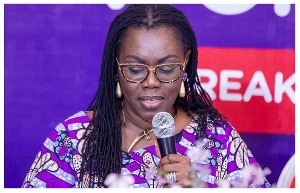The Minister of Communications and Digitalisation, Ursula Owusu-Ekuful, has announced that processes are underway to develop a local content legislation for the telecommunications sector.
“We are in the process of passing local content legislation for the telecommunications sector and have directed that certain categories of managed services in the telecom sector should be reserved for local Ghanaian companies only,” she noted.
She said the initiative aims to fortify the nation’s ability to oversee its digital infrastructure, applications and services independently, reducing reliance on costly foreign consultants and contractors.
The minister underscored the presence of competent local alternatives, highlighting the potential for sustainable growth and development within the sector.
“That is the only way to build our capacity to manage our own digital infrastructure, applications and services. We have to wean ourselves of unhealthy dependence on expensive foreign consultants and contractors when we have competent local alternatives.
“Many of these foreign companies outsource their contracts to local entities and pocket the huge profits… of course, those who benefit from the current system and their collaborators will protest that we must put the interest of the country and our collective development first instead of some misguided, short-term, individual benefit,” she noted.
Support for indigenous companies
The minister made this known at the official launch of a information communication technology company, Dynamic Data Solutions LMT (dds55) in Accra. She urged support for indigenous companies, particularly in the field of information technology (IT).
She stated that the nation’s progress hinges not only on foreign investments and multinational corporations, but also on the growth and empowerment of local businesses.
To this end, she said in addition to deliberate government policies to complement their efforts, there needs to be a collective shift in mindset toward quality and tolerance, as well as support for local products, in order to bolster indigenous businesses.
“We must rewire our collective mindset. The notion that anything Ghanaian is inferior while everything foreign is superior must be challenged. Let us champion our own, not just in words but also in our choices, preferences and spending habits. If we do not support made-in-Ghana goods and companies, how can we expect others to do so?
“Also, we recognise that quality may not be top-notch initially. However, we must exhibit healthy tolerance and patience. Supporting local industries means nurturing their growth. It is not mediocrity; it’s confidence-building for our Ghanaian businesses,” the minister explained.
“Remember the ‘Buy Made-in-Ghana’ campaign? It’s time to breathe new life into it. Let us consciously choose Ghanaian services and products – whether it’s clothing, food or technology. By doing so, we create demand, encourage innovation and strengthen our economy,” she concluded.
Business News of Monday, 22 April 2024
Source: thebftonline.com

















